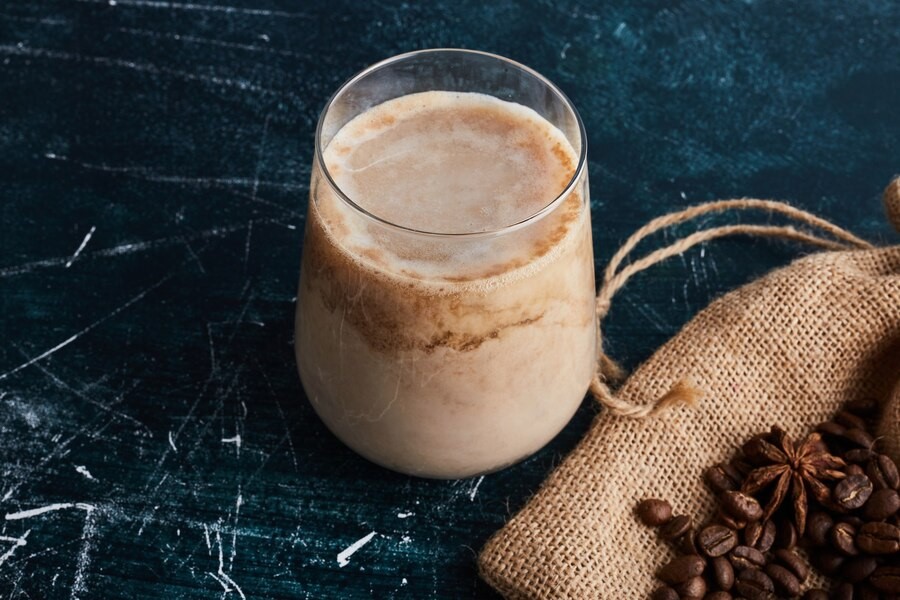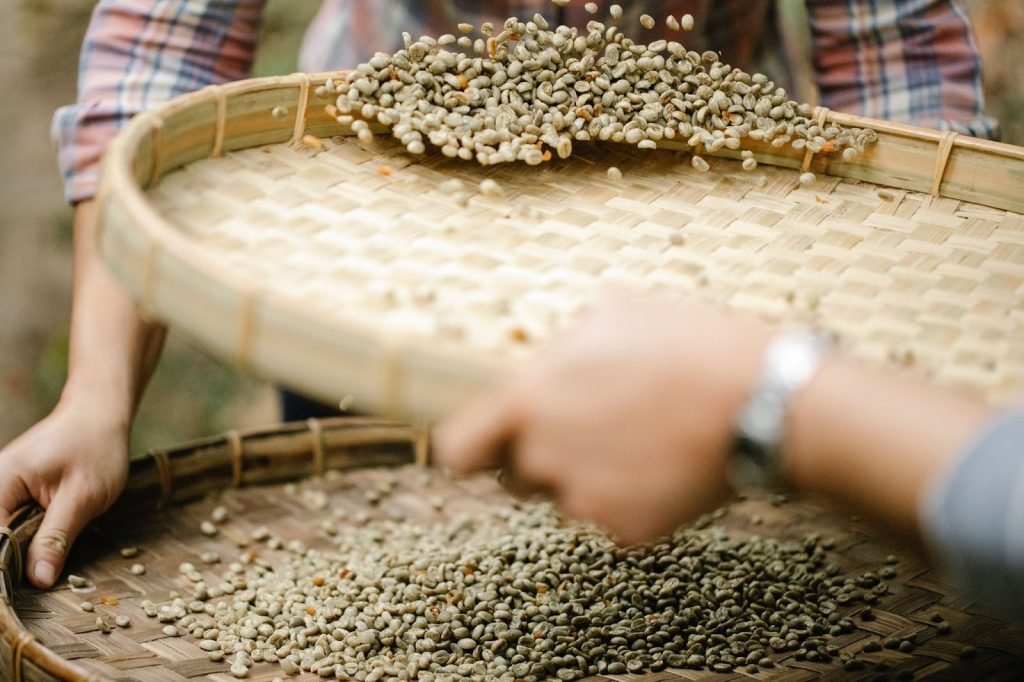The decaf or decaffeination process is a set of methods useful for removing some or most of the caffeine from coffee beans. The main goal of this process is to produce coffee that has lower caffeine levels than regular coffee, making it suitable for those who want to avoid the stimulant effects of caffeine.
Methods in the Decaf Process
There are several methods commonly used in the decaf process, including:
1. Solvent-Based Decaf Process
This is one of the most common decaffeination methods. Coffee beans are soaked in chemical solvents such as methylene chloride or ethyl acetate. These solvents dissolve the caffeine from the coffee beans. Afterward, the coffee beans are washed and dried to remove any remaining solvent. This process results in decaf coffee beans with low caffeine levels.
2. Swiss Water Process
This method avoids the use of chemical solvents. Coffee beans are soaked in hot water to extract caffeine and other compounds. The water containing the caffeine extract is then treated through a series of special filters to remove only the caffeine. The remaining water is then useful for soaking the next batch of coffee beans, so that they do not lose any flavor characteristics other than caffeine.
3. Carbon Dioxide Process (CO2 Decaf Process)
This method involves using supercritical carbon dioxide to remove caffeine.CO2 in its supercritical form is useful as an effective and safe solvent. The coffee beans are soaked in supercriticalCO2, and the caffeine dissolves in theCO2. Then, theCO2 is separated from the coffee beans, and the beans are dried. This is also a more environmentally friendly decaffeination method.
4. Robusta Decaffeination Process
The decaffeination method can also be applied to Robusta coffee beans, although the process may be slightly different due to the different characteristics of Robusta beans.
The result of the decaf process is coffee beans that have lower caffeine levels, often around 97% – 99% less caffeine than regular coffee beans. However, it is important to note that the decaffeination process can affect the flavor profile of coffee. Some coffee lovers find that decaf coffee has a different or weaker flavor than regular coffee, while others may not find a significant difference. The choice of coffee bean type, decaffeination method, and roasting method can also affect the final flavor outcome of decaf coffee.
People choose decaf coffee for various personal and health reasons.
Reasons to Choose Decaf
Here are some of the main reasons why people choose decaf:
1. Sensitivity to Caffeine
Some people have a high level of sensitivity to caffeine. Caffeine may cause them to feel jittery, anxious, or interfere with sleep. To avoid these side effects, they turn to decaf coffee.
2. Avoiding Sleep Disorders
Caffeine is a stimulant that can affect sleep patterns. People who want to sleep well at night tend to avoid caffeine, especially in the afternoon or evening.
3. Heart Health
Several studies have shown that excessive consumption of caffeine can affect blood pressure and heart health. People with heart problems or high blood pressure may be advised to reduce their caffeine intake by opting for decaf coffee.
4. Health Problems
Individuals with certain medical conditions, such as high acidity or other digestive diseases, may prefer decaf coffee as caffeine can worsen their symptoms.
5. Lighter Taste
Some people prefer the taste of coffee, but don’t want to consume excess caffeine. Decaf coffee gives them the opportunity to enjoy the pleasure of coffee flavor without the stimulant effects.
6. Nighttime Consumption
People who like to drink coffee at night, especially after dinner, tend to opt for decaf coffee to ensure their sleep is not disturbed.
7. Flavor Options
Some people may like certain decaf coffee flavors that they find more interesting or milder than regular coffee.
8. Diet Options
For those who want to control their caffeine intake in their diet, decaf coffee is a suitable alternative.
Decaf coffee still contains some caffeine, albeit in much lower amounts than regular coffee. The level of caffeine in decaf coffee can vary depending on the decaffeination process and the specific brand of coffee. Therefore, for those who must completely avoid caffeine, it is important to check the label well and choose a decaf coffee with caffeine levels according to their preferences.
How Decaf Coffee Differs from Regular Coffee
The differences that coffee connoisseurs may encounter in the flavor of decaf coffee compared to regular coffee may vary depending on various factors, including the decaffeination method used, the type of coffee beans, and the roasting method. Here are some of the differences that may be noticed:
1. Weaker Taste Power
Since most of the caffeine is removed during the decaffeination process, decaf coffee generally has a weaker or less intense flavor than regular coffee. This can make it taste less bold.
2. Better Balance of Flavor
Decaf coffee has a better balance of flavors. This means that acidity, sweetness, and other flavor nuances can be tasted more balanced, without the dominance of caffeine.
3. Smoother Taste
The flavor of decaf coffee tends to be smoother and milder. This can make it easier to drink for those looking for flavor enjoyment without the strain of caffeine.
4. Brighter Nuances of Scent
Some coffee connoisseurs may find that decaf coffee has a brighter and more complex aroma. This may include more pronounced nuances of fruits, flowers, or spices.
5. Lighter Body
Decaf coffee tends to have a lighter body on the tongue. This means the texture and viscosity in the mouth may be weaker than regular coffee.
6. Thicker Sweetness
Some people find decaf coffee to have a thicker sweet impression than regular coffee. This can be a more pronounced sugar or caramel flavor.
7. Flavor Variability
Like regular coffee, the flavor of decaf coffee can also vary depending on the bean variety, place of origin, roasting method, and many other factors. Hence, there is a wide variety of flavors in the decaf coffee category.
Problems that May Occur
The decaf process is a complex and delicate process, and in carrying it out, there are several issues and challenges that may exist, especially in maintaining the integrity of the coffee flavor. Here are some of the issues that can arise:
1. Loss of Taste
One of the biggest challenges in decaffeination is maintaining the flavor of the coffee. The decaf process can result in the loss of some compounds that contribute to coffee’s unique flavor and aroma. Therefore, attempts to remove caffeine may also reduce the flavor characteristics of coffee.
2. Effect of Decaffeination Method
Different decaffeination methods may affect the flavor of coffee differently. For example, chemical solvent dissolving decaffeination methods may leave chemical residues that affect the flavor. Inappropriate or excessive use of decaffeination methods can ruin the taste of coffee.
3. Proper Roasting
Theroasting process of decaf coffee beans must be done carefully. Otherwise, the beans may be overcooked or too dark, which may result in an unbalanced or bitter taste.
4. Quality of Original Coffee Beans
The quality of the original coffee beans is very important in producing good decaf coffee. Poor coffee beans will produce poor quality decaf coffee and may have an unappetizing taste.
5. Variety Differences
The variety of coffee beans also affects the flavor of decaf coffee. For example, Arabica and Robusta beans have different flavor profiles, and the decaffeination method may affect them differently.
6. Higher Production Costs
The decaf process is often more expensive than the regular process as it involves additional steps such as decaffeination and careful roasting. This can result in higher prices for consumers.
7. Challenges in the Best Decafer
In some cases, the decaffeination process may not be successful in completely removing all caffeine, which can be disappointing for those looking for a completely decaffeinated coffee.
The selection of quality coffee beans, the use of proper decaffeination methods, and careful roasting are key to maintaining the flavor integrity of decaf coffee. Quality-focused coffee producers will strive to address these issues and ensure that the decaf coffee they produce remains delicious and appetizing.
The decaf process is an important milestone in the coffee world that allows more people to enjoy the pleasure of coffee without the effects of caffeine. As decaffeination technology and methods continue to evolve, we can expect further innovations in maintaining the flavor quality of decaf coffee and making it an attractive option for all coffee lovers.









